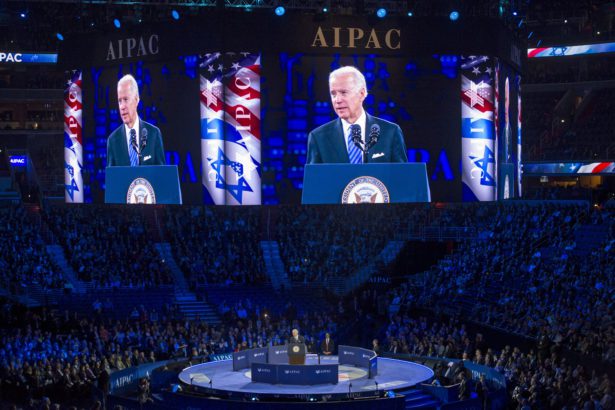Israel has scored what it considers a string of political and policy victories since Biden took office… Biden has largely continued the heavily pro-Israel policies of his predecessor in the Oval Office, Donald Trump…
By Nahal Toosi, reposted from Politico [photos and annotations added by IAK]
President Joe Biden will reluctantly set aside his human rights qualms to meet Saudi Crown Prince Mohammed bin Salman next week, an awkward encounter that U.S. officials hope will help lower energy prices spiked by Russia’s invasion of Ukraine.
But the biggest winner of the meeting won’t be Saudi Arabia, the United States or even the war effort against Russia.
It’s Israel.
From the failed revival of the Iran nuclear deal to the effective shelving of U.S. hopes for a Palestinian state, the Israeli government has directly or inadvertently scored what it considers a string of political and policy victories since Biden took office.
The U.S. president’s desire to avoid domestic political blowback [from the powerful and pervasive Israel lobby] and reduce America’s exposure in the Middle East has empowered aides, such as veteran national security hand Brett McGurk, who tend to push policies preferred by Israel and like-minded Arab states that effectively downplay human rights, three current and former U.S. officials as well as outside observers say. And Israel’s turbulent politics — the country is heading into its fifth election in less than four years — has made Biden and his deputies reluctant to pick fights with its leaders.
Biden has several reasons to grit his teeth and see the young Saudi prince, the country’s de facto ruler, whom U.S. officials hold responsible for the murder of Washington Post journalist Jamal Khashoggi, among other abuses. Perhaps most urgent: Biden needs the oil-rich Gulf Arab states, including Saudi Arabia, to help lower skyrocketing energy prices caused by Russia’s war on Ukraine, a move that would indirectly boost Kyiv, which is worried about waning international support as the conflict bleeds on. Food security, another hot-button issue thanks to the war, is also on the agenda. [For info on Russia-Ukraine see this and this.]
But for Israeli leaders, the U.S.-Saudi meeting offers something else — hope that Washington can fix its broken relations with Riyadh and nudge it to join other Arab capitals that have established historic diplomatic ties with Israel in recent years.
In a visit slated for Wednesday to Saturday, Biden will go to Israel first, then stop by to meet Palestinian leaders in the West Bank before heading to the Saudi city of Jeddah to see the crown prince and other Arab leaders gathered for a regional summit. Biden has shown little enthusiasm about seeing the Saudi royal; in fact, he’s pointed to the Israel factor as one reason he will do so.
“What I want to do is see to it that we diminish the likelihood that there’s a continuation of this — some of the senseless wars between Israel and the Arab nations,” Biden said. “And that’s what I’m focused on.”
An Israeli official, meanwhile, dismissed the idea that one country would benefit more than others. “There’s strategic logic to this trip,” insisted the official, who spoke on condition of anonymity due to the sensitivity of the topic. “It’s a win for the United States. It’s a win for Israel, and it’s a win for the Saudis. Everybody wins.”
The sticky Trump legacy
Biden has largely continued the heavily pro-Israel policies of his predecessor in the Oval Office, Donald Trump.
Trump recognized Jerusalem as Israel’s capital and moved the U.S. embassy there while closing the U.S. consulate that dealt with the Palestinians. He effectively zeroed out financial aid to the Palestinians and supported the Abraham Accords, which saw Israel establish diplomatic ties with the United Arab Emirates, Morocco, Bahrain and Sudan.
While Trump didn’t rule out a Palestinian state, his policies severely undercut the possibility. For example, his administration tossed out decades of U.S. policy in declaring that Israeli settlements on land claimed by Palestinians did not violate international law.
The Biden administration has restored much of the funding for the Palestinian people. It has re-established a direct diplomatic channel to deal with Palestinians. And, to the chagrin of the Israeli government, it placed an Israeli spyware company, the NSO group, on a U.S. blacklist over concerns about how its technology was being used.
“Biden administration officials tell me ‘we are putting private pressure’ in response to Israeli human rights abuses, to which my response is, ‘Okay, how’s that going?’ Because the facts on the ground indicate ‘private pressure’ isn’t really accomplishing anything,” said Matt Duss, a top foreign policy adviser to Sen. Bernie Sanders (I-Vermont).
An old school aide

Current and former U.S. officials say much of the president’s Middle East policy is being shaped by Brett McGurk, a senior National Security Council staffer who has served multiple presidents from both parties.
McGurk is close to Arab officials from the Persian Gulf region who, like Israel, view Iran as a major menace. His views, the three current and former officials say, tend to dovetail with Arab states’ requests, which these days often coincide with Israeli desires, such as building a bulwark against Iran.
Early on, McGurk was skeptical about other Biden aides’ efforts to quickly restore the Iran nuclear deal, which Saudi Arabia, the United Arab Emirates and Israel have long opposed, although he has supported the overall idea of reviving the agreement.
U.S. efforts to restore the nuclear deal, which Trump quit in 2018, have so far failed, and the Biden administration appears poised to further ratchet up sanctions on Iran, to the delight of Israel and some Arab states.
Israel, meanwhile, recently announced it wants to establish a U.S.-backed regional air defense alliance. The alliance appears likely to include some of its Arab neighbors and defend against Iran-backed missile and other attacks.
Current U.S. officials describe McGurk as an old-school Middle East hand [This is a stretch; earlier diplomats, who possessed considerably more expertise on the region, opposed such unconditional support for Israel.] He wants to promote stability in the region because he sees it as being in America’s broader interest, and he believes that requires regularly engaging with leaders there — despite their questionable records. [For more on McGurk see this.]
McGurk does not believe that Biden’s goal of prioritizing the U.S. rivalry with China means that the United States needs to reduce its ties to the Middle East. He does, however, see value in pushing for an end to long-simmering conflicts that have embroiled the Middle East. One of the Biden team’s success stories — at least for now — is a truce in Yemen between Saudi-led forces and Iran-back rebels who’d been fighting for seven years.
Ultimately, the policy is set by Biden, who has decades of foreign affairs experience, has long been staunchly pro-Israel, and is happy to overrule his aides if they do not make an argument he finds compelling. Biden was deeply involved in efforts to limit last year’s outbreak of violence between Israel and Palestinian militants in the Gaza Strip.
As vice president during the Barack Obama administration, Biden saw the domestic political blowback that comes when a president clashes with Israeli leaders — in Obama’s case on the Iran deal, settlements and more — and he’s inclined to avoid such blowups.
“The president is a guy [for whom] being good on Israel is baked deep into his political DNA,” said Aaron David Miller, a former U.S. official who dealt with the Middle East and is now with the Carnegie Endowment for International Peace. “He learned from Obama what not to do.” [Aaron David Miller is an Israel partisan who admitted that he and other officials acted in effect like “Israel’s attorney“.]
The Israeli official stressed that the United States and Israel “have a very open dialogue.” “We know how to manage disagreement, and we do it respectfully,” the person said.
The Biden team has avoided pressuring Israeli leaders on topics like restarting peace talks with the Palestinians, who themselves seem unprepared for such discussions, the current and former officials say.
The Palestinians have not helped their own cause in the eyes of many Arab leaders or U.S. officials. Corruption, disorganization and a lack of a true mandate complicate any chance of diplomatic breakthroughs in Ramallah.
Jerusalem has its own baggage. For months, Israel was led by an unwieldy coalition of political parties who joined forces in large part to push out longtime Prime Minister Benjamin Netanyahu. Netanyahu was a huge Trump supporter who deeply offended many Obama aides now working for Biden.
The leadership that replaced him, headed by Prime Minister Naftali Bennett, was diverse but leaned right. The Biden team viewed it as more reasonable than Netanyahu. Even as it showed no interest in talking about statehood for Palestinians, the coalition took some steps to improve their lives, such as issuing them more work permits. It also voiced its criticisms of the United States at a lower decibel than Netanyahu.
Last month, the coalition collapsed, and now another Israeli election is expected in the fall. U.S. officials dread the potential return of Netanyahu, who made his disagreements with the United States very public and rallied Republicans to his side, damaging the bipartisan nature of Israel policy in Washington.
Another journalist killed
In the near term, Israel seems content not to have Washington meddling too much in its affairs. But in the long run, there could be a cost.
Israeli as well as Arab leaders may grow frustrated by a Washington more focused on China and the Russia-Ukraine war. If the Abraham Accords and other efforts — such as an ongoing Saudi-Iran dialogue — do lead to more stability, U.S. detachment from the region is arguably even more likely.
But the Middle East always has a way of edging back into the headlines — often for the wrong reasons.
In recent weeks, the Biden administration has faced intense criticism for its response to the killing of prominent Palestinian-American journalist Shireen Abu Akleh.

Multiple investigations by media organizations as well as a United Nations panel say evidence points to Israeli soldiers having shot the journalist.
Publicly, the Biden administration did not initially demand that Israel allow for an official “independent” investigation. Instead, it kept calling for an “impartial” probe.
On July 4, the State Department announced that its overall review of the situation had determined that the gunfire that killed the journalist likely came from Israeli forces, but that the bullet itself was too damaged to offer a definitive conclusion. | Adel Hana/AP Photo
“We have two sets of authorities, two sets of security officials that are perfectly capable of doing a thorough investigation,” the senior State Department official said.
Longtime Israel critics alleged that Israel could not carry out an impartial probe, even when the victim is American. “Israel’s record of investigating itself is quite terrible. We’ve seen it time and again,” said Khaled El-Gindy of the Middle East Institute.
Behind the scenes, U.S. officials pressed the Israelis and the Palestinians to get to the bottom of what happened, including cooperating when necessary. U.S. officials eventually oversaw a forensic examination of the bullet that had struck Abu Akleh, which was in the possession of Palestinian officials.
On July 4, the State Department announced that its overall review of the situation had determined that the gunfire that killed the journalist likely came from Israeli forces, but that the bullet itself was too damaged to offer a definitive conclusion. The department also said it had no reason to believe the killing was intentional, but that it was “the result of tragic circumstances.”
Although it insisted it would continue to push for accountability, the U.S. conclusion infuriated some rights advocates who said it placed too much trust in the Israeli version of events.
“A shocking abdication of responsibility by the United States,” was how Sarit Michaeli, an international advocacy officer for B’Tselem, the Israeli rights group, described it. Abu Akleh’s family also slammed the finding, saying the U.S. ignored the idea that Israeli policies view all Palestinians as “legitimate targets.”
The worry among advocates for Palestinians is that the Biden administration will, over time, let the issue fade in another example of deference to Israel. After all, there’s a war in Europe, U.S. midterm elections coming up, and plenty of other crises.
As one former U.S. official put it: “We’re trying to focus on elsewhere in the world.”
Nahal Toosi is POLITICO’s senior correspondent for foreign affairs and national security.




